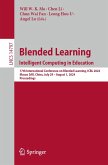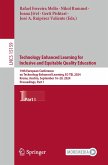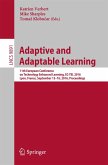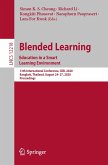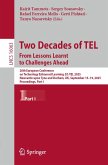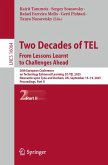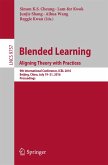Blended Learning. Sustainable and Flexible Smart Learning (eBook, PDF)
18th International Conference on Blended Learning, ICBL 2025, Bangkok, Thailand, July 22-25, 2025, Proceedings
Redaktion: Ma, Will W. K.; Mungwattana, Anan; Prayadsab, Praewpran; Li, Chen; Cheung, Simon S. K.
104,95 €
inkl. MwSt.
Sofort per Download lieferbar

52 °P sammeln
Blended Learning. Sustainable and Flexible Smart Learning (eBook, PDF)
18th International Conference on Blended Learning, ICBL 2025, Bangkok, Thailand, July 22-25, 2025, Proceedings
Redaktion: Ma, Will W. K.; Mungwattana, Anan; Prayadsab, Praewpran; Li, Chen; Cheung, Simon S. K.
- Format: PDF
- Merkliste
- Auf die Merkliste
- Bewerten Bewerten
- Teilen
- Produkt teilen
- Produkterinnerung
- Produkterinnerung

Bitte loggen Sie sich zunächst in Ihr Kundenkonto ein oder registrieren Sie sich bei
bücher.de, um das eBook-Abo tolino select nutzen zu können.
Hier können Sie sich einloggen
Hier können Sie sich einloggen
Sie sind bereits eingeloggt. Klicken Sie auf 2. tolino select Abo, um fortzufahren.

Bitte loggen Sie sich zunächst in Ihr Kundenkonto ein oder registrieren Sie sich bei bücher.de, um das eBook-Abo tolino select nutzen zu können.
This book constitutes the refereed proceedings of the 18th International Conference on Blended Learning, ICBL 2025, held in Bangkok, Thailand, during July 22-25, 2025.
The 24 full papers included in this book were carefully reviewed and selected from 60 submissions. They were organized in topical sections as follows: Keynotes, AI and Robotics in Education, Innovative Teaching Methods in Blended Learning, Pedagogical Strategies and Student Engagement, Evaluation and Feedback in Blended Learning, Data-Driven Learning Analytics and Context-Aware Systems.
- Geräte: PC
- ohne Kopierschutz
- eBook Hilfe
- Größe: 29.1MB
Andere Kunden interessierten sich auch für
![Blended Learning. Intelligent Computing in Education (eBook, PDF) Blended Learning. Intelligent Computing in Education (eBook, PDF)]() Blended Learning. Intelligent Computing in Education (eBook, PDF)60,95 €
Blended Learning. Intelligent Computing in Education (eBook, PDF)60,95 €![Technology Enhanced Learning for Inclusive and Equitable Quality Education (eBook, PDF) Technology Enhanced Learning for Inclusive and Equitable Quality Education (eBook, PDF)]() Technology Enhanced Learning for Inclusive and Equitable Quality Education (eBook, PDF)64,95 €
Technology Enhanced Learning for Inclusive and Equitable Quality Education (eBook, PDF)64,95 €![Adaptive and Adaptable Learning (eBook, PDF) Adaptive and Adaptable Learning (eBook, PDF)]() Adaptive and Adaptable Learning (eBook, PDF)72,95 €
Adaptive and Adaptable Learning (eBook, PDF)72,95 €![Blended Learning. Education in a Smart Learning Environment (eBook, PDF) Blended Learning. Education in a Smart Learning Environment (eBook, PDF)]() Blended Learning. Education in a Smart Learning Environment (eBook, PDF)64,95 €
Blended Learning. Education in a Smart Learning Environment (eBook, PDF)64,95 €![Two Decades of TEL. From Lessons Learnt to Challenges Ahead (eBook, PDF) Two Decades of TEL. From Lessons Learnt to Challenges Ahead (eBook, PDF)]() Two Decades of TEL. From Lessons Learnt to Challenges Ahead (eBook, PDF)64,95 €
Two Decades of TEL. From Lessons Learnt to Challenges Ahead (eBook, PDF)64,95 €![Two Decades of TEL. From Lessons Learnt to Challenges Ahead (eBook, PDF) Two Decades of TEL. From Lessons Learnt to Challenges Ahead (eBook, PDF)]() Two Decades of TEL. From Lessons Learnt to Challenges Ahead (eBook, PDF)52,95 €
Two Decades of TEL. From Lessons Learnt to Challenges Ahead (eBook, PDF)52,95 €![Blended Learning: Aligning Theory with Practices (eBook, PDF) Blended Learning: Aligning Theory with Practices (eBook, PDF)]() Blended Learning: Aligning Theory with Practices (eBook, PDF)40,95 €
Blended Learning: Aligning Theory with Practices (eBook, PDF)40,95 €-
-
-
This book constitutes the refereed proceedings of the 18th International Conference on Blended Learning, ICBL 2025, held in Bangkok, Thailand, during July 22-25, 2025.
The 24 full papers included in this book were carefully reviewed and selected from 60 submissions. They were organized in topical sections as follows: Keynotes, AI and Robotics in Education, Innovative Teaching Methods in Blended Learning, Pedagogical Strategies and Student Engagement, Evaluation and Feedback in Blended Learning, Data-Driven Learning Analytics and Context-Aware Systems.
The 24 full papers included in this book were carefully reviewed and selected from 60 submissions. They were organized in topical sections as follows: Keynotes, AI and Robotics in Education, Innovative Teaching Methods in Blended Learning, Pedagogical Strategies and Student Engagement, Evaluation and Feedback in Blended Learning, Data-Driven Learning Analytics and Context-Aware Systems.
Dieser Download kann aus rechtlichen Gründen nur mit Rechnungsadresse in A, B, BG, CY, CZ, D, DK, EW, E, FIN, F, GR, HR, H, IRL, I, LT, L, LR, M, NL, PL, P, R, S, SLO, SK ausgeliefert werden.
Produktdetails
- Produktdetails
- Verlag: Springer Nature Singapore
- Seitenzahl: 314
- Erscheinungstermin: 23. Juni 2025
- Englisch
- ISBN-13: 9789819684304
- Artikelnr.: 74628927
- Verlag: Springer Nature Singapore
- Seitenzahl: 314
- Erscheinungstermin: 23. Juni 2025
- Englisch
- ISBN-13: 9789819684304
- Artikelnr.: 74628927
- Herstellerkennzeichnung Die Herstellerinformationen sind derzeit nicht verfügbar.
.- Keynotes.
.- Empowering teacher agency in the era of Artificial Intelligence: challenges and strategies.
.- Integrating Generative AI into Research-Based Learning for Undergraduate Students: Perceptions, Adoption Drivers, and Its Impact on Research Performance.
.- The 3D-POD Model for AI-Driven Institutional Transformation and Graduate Employment Readiness in Thailand in Digital Era.
.- Leveraging Artificial Intelligence for Enhanced Language Teaching and Learning in Higher Education.
.- AI and Robotics in Education.
.- University Students Perceptions of Using Generative Artificial Intelligence in Digital Storytelling Creation: Cognition, Willingness, and Concerns.
.- Enhancing Psychological Safety in Online Learning Environment with Generative AI.
.- Exploring Sustainable Determinants to the Continuance Intention of Generative AI in Education.
.- A Humanoid Robot-assisted Collaborative Programming Approach to Enhancing Middle .
.- School Students' Computational Thinking, Learning Motivation and Interaction.
.- Innovative Teaching Methods in Blended Learning.
.- Learning Programming by Making Games: Design and Development of MetaDream.
.- Promoting Preschool Second Language Vocabulary Learning through a DVR Educational
Game.
.- Enhancing Database Course Experiments with Cyber Ranges: A New Approach in
Educational Practice.
.- Designing a Workshop to Develop Azerbaijani Teachers Thinking Skills Instruction
through ChatGPT.
.- Pedagogical Strategies and Student Engagement.
.- Effects of E-learning Acceptance on Academic Performance and E-Learning Satisfaction Among College Students in a Blended Learning Context.
.- The Effectiveness of Blended Learning and a Future Vision of Optimal Learning, as Observed from Data Collected from Approximately 3,000 Adults Enrolled in Corporate Language Learning Courses at Japanese Companies.
.- Enhance Learner Engagement through Experiential Learning in a Gamified Simulation: A Longitudinal Study.
.- Design Human-machine Collaborative Learning Activities for Enhancing Primary School Students English Listening and Speaking Ability.
.- Evaluation and Feedback in Blended Learning.
.- An Analysis of Evaluation Practices in Agile Learning and Blended Learning.
.- Implementation of Agile-Blended Learning: A Case Study of Course Design on Translation Technology.
.- Study on the Effect of Peer Feedback on Learning Outcomes in Rotational Synchronous
Classrooms.
.- Evaluating the Effectiveness of VR Safety Training Programmes in Hong Kong's Construction Industry.
.- Data-Driven Learning Analytics and Context-Aware Systems.
.- Fine-tuned BERT Model for Sentiment Classification of Chinese MOOCs.
.- Context-Aware Multi-Label Classification for Collaborative Problem Solving Dialogue
Analysis.
.- Exploring Engineering Undergraduate s Critical Thinking Patterns in AI-Enhanced Learning: A TCSA Method.
.- A Semi-Automatic Robotic-Assisted Software Program to Support Upper Limb Muscle Therapy in Children with Cerebral Palsy.
.- Empowering teacher agency in the era of Artificial Intelligence: challenges and strategies.
.- Integrating Generative AI into Research-Based Learning for Undergraduate Students: Perceptions, Adoption Drivers, and Its Impact on Research Performance.
.- The 3D-POD Model for AI-Driven Institutional Transformation and Graduate Employment Readiness in Thailand in Digital Era.
.- Leveraging Artificial Intelligence for Enhanced Language Teaching and Learning in Higher Education.
.- AI and Robotics in Education.
.- University Students Perceptions of Using Generative Artificial Intelligence in Digital Storytelling Creation: Cognition, Willingness, and Concerns.
.- Enhancing Psychological Safety in Online Learning Environment with Generative AI.
.- Exploring Sustainable Determinants to the Continuance Intention of Generative AI in Education.
.- A Humanoid Robot-assisted Collaborative Programming Approach to Enhancing Middle .
.- School Students' Computational Thinking, Learning Motivation and Interaction.
.- Innovative Teaching Methods in Blended Learning.
.- Learning Programming by Making Games: Design and Development of MetaDream.
.- Promoting Preschool Second Language Vocabulary Learning through a DVR Educational
Game.
.- Enhancing Database Course Experiments with Cyber Ranges: A New Approach in
Educational Practice.
.- Designing a Workshop to Develop Azerbaijani Teachers Thinking Skills Instruction
through ChatGPT.
.- Pedagogical Strategies and Student Engagement.
.- Effects of E-learning Acceptance on Academic Performance and E-Learning Satisfaction Among College Students in a Blended Learning Context.
.- The Effectiveness of Blended Learning and a Future Vision of Optimal Learning, as Observed from Data Collected from Approximately 3,000 Adults Enrolled in Corporate Language Learning Courses at Japanese Companies.
.- Enhance Learner Engagement through Experiential Learning in a Gamified Simulation: A Longitudinal Study.
.- Design Human-machine Collaborative Learning Activities for Enhancing Primary School Students English Listening and Speaking Ability.
.- Evaluation and Feedback in Blended Learning.
.- An Analysis of Evaluation Practices in Agile Learning and Blended Learning.
.- Implementation of Agile-Blended Learning: A Case Study of Course Design on Translation Technology.
.- Study on the Effect of Peer Feedback on Learning Outcomes in Rotational Synchronous
Classrooms.
.- Evaluating the Effectiveness of VR Safety Training Programmes in Hong Kong's Construction Industry.
.- Data-Driven Learning Analytics and Context-Aware Systems.
.- Fine-tuned BERT Model for Sentiment Classification of Chinese MOOCs.
.- Context-Aware Multi-Label Classification for Collaborative Problem Solving Dialogue
Analysis.
.- Exploring Engineering Undergraduate s Critical Thinking Patterns in AI-Enhanced Learning: A TCSA Method.
.- A Semi-Automatic Robotic-Assisted Software Program to Support Upper Limb Muscle Therapy in Children with Cerebral Palsy.
.- Keynotes.
.- Empowering teacher agency in the era of Artificial Intelligence: challenges and strategies.
.- Integrating Generative AI into Research-Based Learning for Undergraduate Students: Perceptions, Adoption Drivers, and Its Impact on Research Performance.
.- The 3D-POD Model for AI-Driven Institutional Transformation and Graduate Employment Readiness in Thailand in Digital Era.
.- Leveraging Artificial Intelligence for Enhanced Language Teaching and Learning in Higher Education.
.- AI and Robotics in Education.
.- University Students Perceptions of Using Generative Artificial Intelligence in Digital Storytelling Creation: Cognition, Willingness, and Concerns.
.- Enhancing Psychological Safety in Online Learning Environment with Generative AI.
.- Exploring Sustainable Determinants to the Continuance Intention of Generative AI in Education.
.- A Humanoid Robot-assisted Collaborative Programming Approach to Enhancing Middle .
.- School Students' Computational Thinking, Learning Motivation and Interaction.
.- Innovative Teaching Methods in Blended Learning.
.- Learning Programming by Making Games: Design and Development of MetaDream.
.- Promoting Preschool Second Language Vocabulary Learning through a DVR Educational
Game.
.- Enhancing Database Course Experiments with Cyber Ranges: A New Approach in
Educational Practice.
.- Designing a Workshop to Develop Azerbaijani Teachers Thinking Skills Instruction
through ChatGPT.
.- Pedagogical Strategies and Student Engagement.
.- Effects of E-learning Acceptance on Academic Performance and E-Learning Satisfaction Among College Students in a Blended Learning Context.
.- The Effectiveness of Blended Learning and a Future Vision of Optimal Learning, as Observed from Data Collected from Approximately 3,000 Adults Enrolled in Corporate Language Learning Courses at Japanese Companies.
.- Enhance Learner Engagement through Experiential Learning in a Gamified Simulation: A Longitudinal Study.
.- Design Human-machine Collaborative Learning Activities for Enhancing Primary School Students English Listening and Speaking Ability.
.- Evaluation and Feedback in Blended Learning.
.- An Analysis of Evaluation Practices in Agile Learning and Blended Learning.
.- Implementation of Agile-Blended Learning: A Case Study of Course Design on Translation Technology.
.- Study on the Effect of Peer Feedback on Learning Outcomes in Rotational Synchronous
Classrooms.
.- Evaluating the Effectiveness of VR Safety Training Programmes in Hong Kong's Construction Industry.
.- Data-Driven Learning Analytics and Context-Aware Systems.
.- Fine-tuned BERT Model for Sentiment Classification of Chinese MOOCs.
.- Context-Aware Multi-Label Classification for Collaborative Problem Solving Dialogue
Analysis.
.- Exploring Engineering Undergraduate s Critical Thinking Patterns in AI-Enhanced Learning: A TCSA Method.
.- A Semi-Automatic Robotic-Assisted Software Program to Support Upper Limb Muscle Therapy in Children with Cerebral Palsy.
.- Empowering teacher agency in the era of Artificial Intelligence: challenges and strategies.
.- Integrating Generative AI into Research-Based Learning for Undergraduate Students: Perceptions, Adoption Drivers, and Its Impact on Research Performance.
.- The 3D-POD Model for AI-Driven Institutional Transformation and Graduate Employment Readiness in Thailand in Digital Era.
.- Leveraging Artificial Intelligence for Enhanced Language Teaching and Learning in Higher Education.
.- AI and Robotics in Education.
.- University Students Perceptions of Using Generative Artificial Intelligence in Digital Storytelling Creation: Cognition, Willingness, and Concerns.
.- Enhancing Psychological Safety in Online Learning Environment with Generative AI.
.- Exploring Sustainable Determinants to the Continuance Intention of Generative AI in Education.
.- A Humanoid Robot-assisted Collaborative Programming Approach to Enhancing Middle .
.- School Students' Computational Thinking, Learning Motivation and Interaction.
.- Innovative Teaching Methods in Blended Learning.
.- Learning Programming by Making Games: Design and Development of MetaDream.
.- Promoting Preschool Second Language Vocabulary Learning through a DVR Educational
Game.
.- Enhancing Database Course Experiments with Cyber Ranges: A New Approach in
Educational Practice.
.- Designing a Workshop to Develop Azerbaijani Teachers Thinking Skills Instruction
through ChatGPT.
.- Pedagogical Strategies and Student Engagement.
.- Effects of E-learning Acceptance on Academic Performance and E-Learning Satisfaction Among College Students in a Blended Learning Context.
.- The Effectiveness of Blended Learning and a Future Vision of Optimal Learning, as Observed from Data Collected from Approximately 3,000 Adults Enrolled in Corporate Language Learning Courses at Japanese Companies.
.- Enhance Learner Engagement through Experiential Learning in a Gamified Simulation: A Longitudinal Study.
.- Design Human-machine Collaborative Learning Activities for Enhancing Primary School Students English Listening and Speaking Ability.
.- Evaluation and Feedback in Blended Learning.
.- An Analysis of Evaluation Practices in Agile Learning and Blended Learning.
.- Implementation of Agile-Blended Learning: A Case Study of Course Design on Translation Technology.
.- Study on the Effect of Peer Feedback on Learning Outcomes in Rotational Synchronous
Classrooms.
.- Evaluating the Effectiveness of VR Safety Training Programmes in Hong Kong's Construction Industry.
.- Data-Driven Learning Analytics and Context-Aware Systems.
.- Fine-tuned BERT Model for Sentiment Classification of Chinese MOOCs.
.- Context-Aware Multi-Label Classification for Collaborative Problem Solving Dialogue
Analysis.
.- Exploring Engineering Undergraduate s Critical Thinking Patterns in AI-Enhanced Learning: A TCSA Method.
.- A Semi-Automatic Robotic-Assisted Software Program to Support Upper Limb Muscle Therapy in Children with Cerebral Palsy.

